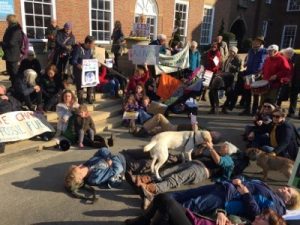Moving from words to action on climate change
During 2019 a remarkable transformation took place in awareness around the looming climate and ecological emergency.
Who would have thought in February, when the South East Climate Alliance (SECA) was formed, that by the end of the year all but one district, borough and county council in the South East would have either declared a climate emergency, or passed a meaningful motion pledging action on the climate.

Many can share the credit for this. SECA’s network of members were part of a global wave of concern that we simply cannot go on treating the planet the way we have been. ‘Our house is on fire’, as Greta Thunberg, memorably put it. ‘We need to sound the alarm!’
That alarm has been rung loud and clear. The question is, what happens next?
Let’s face it, our councils face an extremely tough job in meeting the climate pledges they’ve set and living up to the rhetoric in their bold climate motions. And this was before Covid 19 put a massive spanner in the works.
Councils need all the help they can get. That’s why SECA has changed tack and is shifting from being a pressure group to more of a partner and ‘critical friend’, able to play a watchdog role when needed.
CPRE is a master of this balancing act, which it is one of the reasons it is so widely respected. But many SECA member groups have been starting from scratch in developing relationships with their local councils and learning how local democracy works. It hasn’t always been a smooth ride.
Some councils have welcomed them in with open arms – Adur and Worthing Council joined forces with local green groups to run an ambitious Zero 2030 conference just before lockdown. It sent out a clear message that we are all in this together, and we need to pool our ideas and enthusiasm if we’re going to make progress.
Other councils have been much more guarded and are still reluctant to open their doors to climate activists who only a few months before were staging ‘die-ins’ on the Town Hall steps.
But most councils are realising that partnership is the only way forward and are starting to open up. This is especially the case for any that is aiming to take on the really big challenge of reaching net zero across their entire council area, not just their own council buildings and activities (which typically represents only a few percent of the total emissions pie).
Councils need to team up with university departments, wildlife organisations, farmers, business groups, schools and churches, local environment groups and many others if we are pull this off. This is new territory for everyone. For pressure groups, banging on the door and shouting ‘You are not doing enough’ is a familiar role. When the door starts to open up it demands a whole new mind set, and a willingness on all sides to listen and work out compromises. That’s not to say we won’t need those placards again. But they’re not all we’re going to need to make the changes we want happen.
There are signs that a new phase of partnership and collaboration may be breaking out. Let’s hope so, for we need it urgently.
Geoff Barnard, Member of the SECA Steering Group.

The South East Climate Alliance is a coalition of local environment, community and faith groups across South East England uniting for urgent action on climate change. You can find out more from their website: https://seclimatealliance.uk/ They welcome new member groups, and publish a free monthly email newsletter with latest updates on what’s happening on climate change across the South East.





